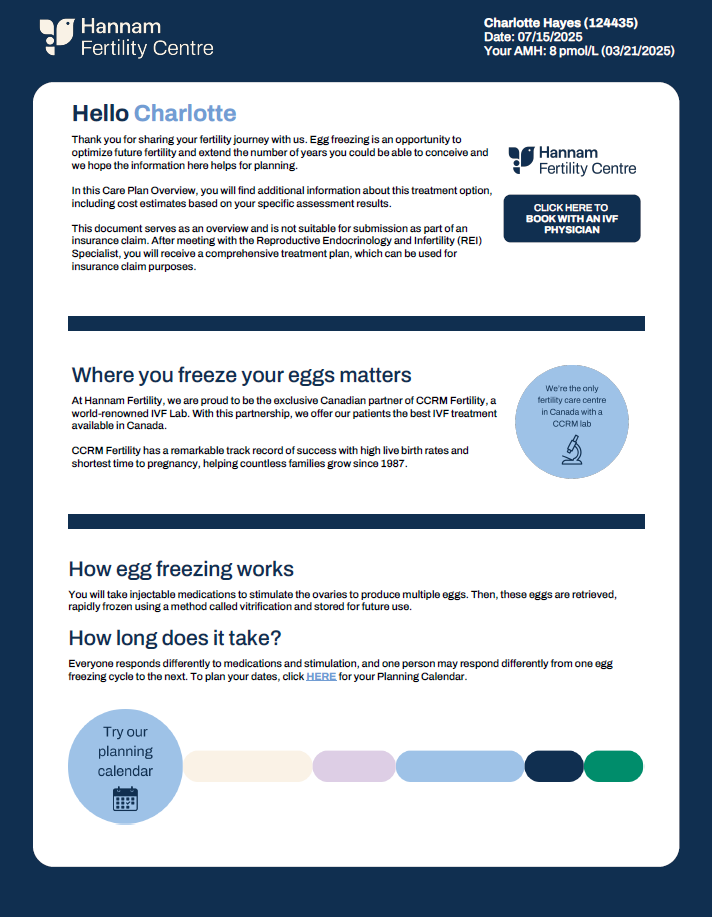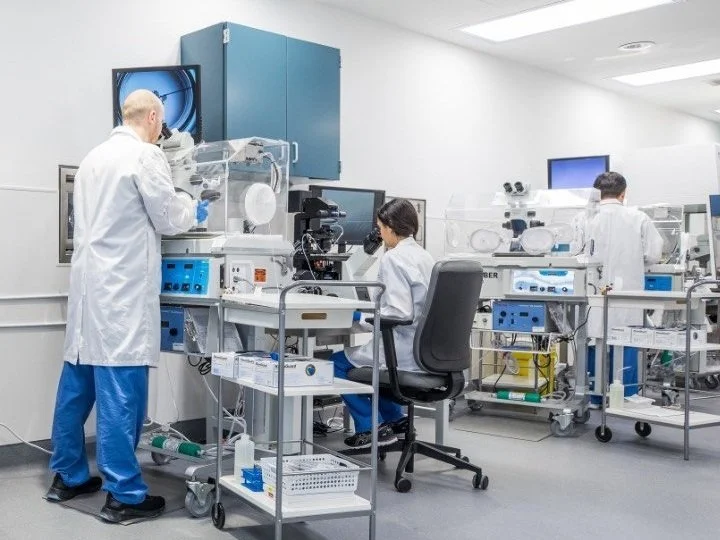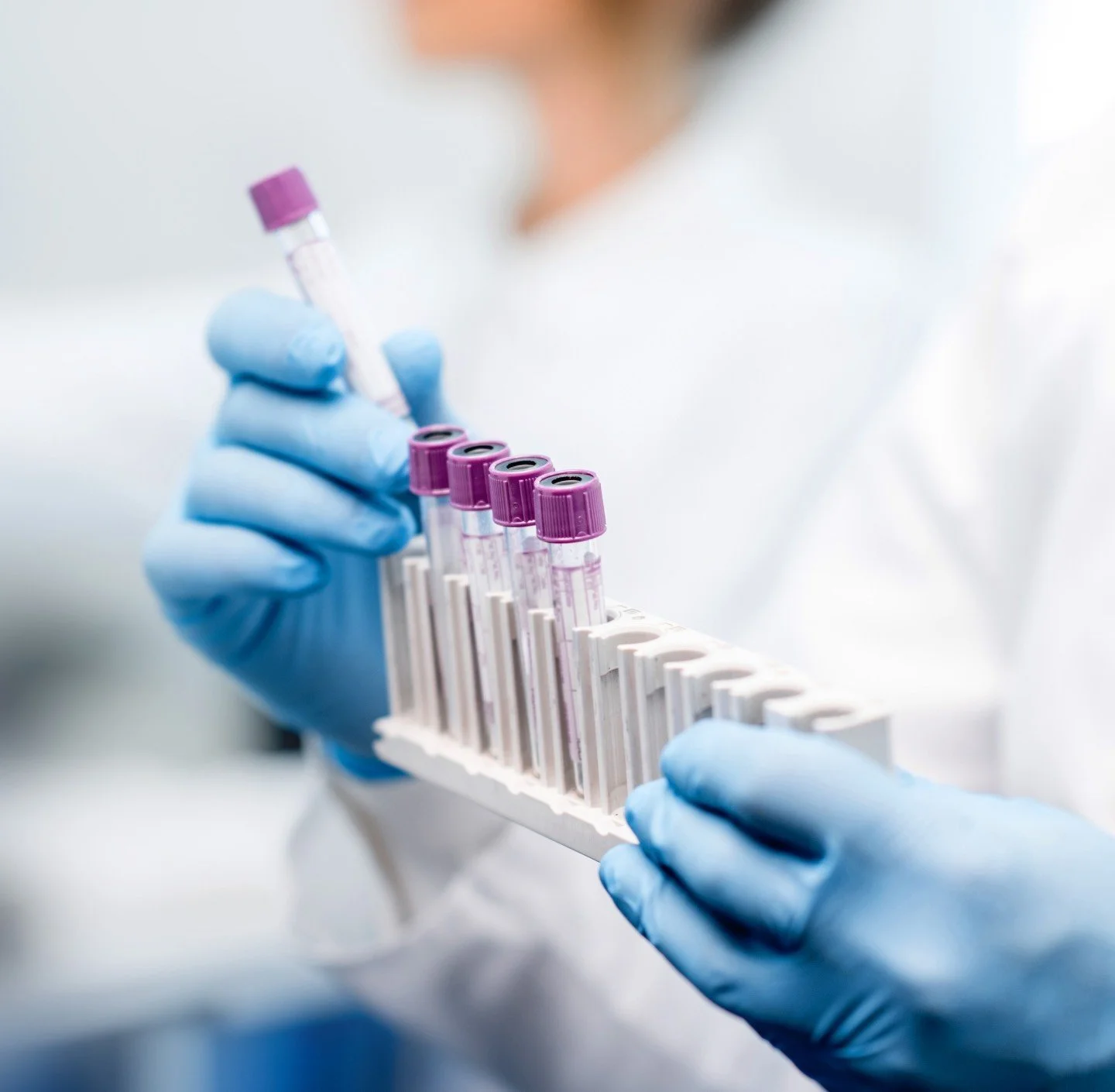EGG FREEZING & EMBRYO FREEZING
A Plan for Your Future: Fertility Preservation
Whether you’re considering egg freezing or embryo freezing, our expert team will guide you through the process step by step, helping you plan for your future family.
No referral required. OHIP-covered consultation
HFC offers both egg freezing and embryo freezing as options to help preserve your fertility potential on your own timeline.
Your eggs or embryos will be securely stored in our gold standard CCRM Toronto lab until you’re ready to use them.
Egg Freezing and Embryo Freezing
Benefits of Freezing for the Future
Preserving your fertility through either egg freezing or embryo freezing empowers you to plan for parenthood on your own terms.
It gives you more flexibility and peace of mind while keeping your options open for the future.
By freezing your eggs or embryos now, you can increase your chances of having a biological child later, when the timing feels right for you.
Who Should Consider Fertility Preservation?
-
If you aren’t ready to start a family yet, or don’t know if you want to, fertility preservation allows you to maintain flexibility for the future.
-
By preserving embryos or eggs, you can keep your options open down the line.
-
Some medical conditions or treatments may impact fertility, so many people consider fertility preservation to optimize their chances of having a family later.
How to Get Started with Egg or Embryo Freezing?
What to Expect
Initial Consultation
The process begins with a 30 minute consultation with our Egg and Embryo Freezing Specialist:
✓ We will ask about your goals and medical history.
✓ You will learn about recommended testing and treatment options and we’ll help you book your initial assessments.
✓ You will have a chance to ask any questions about the process.
Eileen McMahon, Nurse Practitioner and Egg and Embryo Freezing Specialist
Personalized Egg or Embryo Freezing Plan
To freeze eggs or embryos, you’ll take hormonal medications to stimulate your ovaries for retrieval.
Your treatment plan will be personalized to you based on your test results and medical history.
Through our partnership with Venna Health , we are proud to offer you a digital experience.
✓ We provide clear communications with easy-to-understand treatment plans and medication instructions. All plans are tailored to your needs, with transparent pricing.
✓ You will be able to plan your own personalized calendar to help you work around your schedule.
Our care team is fully coordinated to support you seamlessly through the entire process, from initial consultation to post retrieval recovery.
A digital differentiator that keeps you informed and a care team that keeps you supported — every step of your journey.
powered by
Egg Retrieval and Storage
Your eggs will be carefully retrieved on-site by one of our Reproductive Endocrinologists (REIs), who are Royal College certified fertility specialists.
Our team is trained to provide attentive care and will ensure your comfort and well-being are our top priority throughout the procedure.
After the retrieval, the mature eggs or embryos will be frozen at our CCRM Toronto Lab. Our lab has the highest standards in Canada, giving you the best possible chance for success when you’re ready to use them.
Your eggs or embryos will be securely stored onsite at our Toronto location.
Canada’s Gold Standard Lab
Our CCRM Toronto lab leads Canada in safety and standards—your eggs are in expert hands.
Why Choose HFC for Your Fertility Preservation?
Where you freeze your eggs or embryos plays an important role in their future viability.
At HFC, your care is supported by the CCRM Lab—the only fertility lab in Canada accredited by the College of American Pathologists (CAP), the highest international standard for safety and quality. This means your eggs and embryos are protected with exceptional precision every step of the way.
Our clinical team will guide you through the process with expert care, while our lab experts follow the most rigorous protocols during retrieval, freezing, thawing, and implantation—so you can feel confident your future is in the best hands.
Frequently Asked Questions
-
No, ovarian stimulation for egg or embryo freezing doesn’t lower your egg count or ovarian reserve.
Each month, you have a cohort of eggs, of which one matures and is released.
Egg or embryo freezing makes use of the eggs that would have gone unused in a natural cycle, preserving them for potential fertilization in the future.
-
Egg Freezing: Eggs are collected and frozen before fertilization. They can be thawed and fertilized with sperm in the future.
Embryo Freezing (also referred to as Embryo Banking): Retrieved eggs are fertilized with sperm first to create embryos, which are then frozen and stored for future use. Sperm sources can be from partner or from donor. We can support you through the entire process.
In summary, egg freezing saves unfertilized eggs while embryo freezing saves fertilized embryos.
-
From when you first start medication until your egg retrieval (which is part of egg freezing and embryo freezing), it takes 4-6 weeks. Recovery is typically quick, with many patients feeling back to normal within 24-48 hours.
Embryo freezing also involves fertilization, embryo growth, and typically PGT-A testing. This adds up to 2 weeks post-retrieval.
-
Our multidisciplinary team is well-trained to support you before, during, and after the procedure.
Our egg retrieval procedures are performed by Royal College certified physicians.
You will receive medication prior to the procedure to help you relax, conscious sedation during the procedure, and medication after to further reduce any pain or discomfort as you recover. We take your comfort seriously.
-
CAP stands for the College of American Pathologists — the gold standard in laboratory quality and safety worldwide.
This means your care is built on trust and precision.
CAP-accreditation helps ensure that:Your retrieved eggs and embryos are handled using the safest, most reliable protocols.
Test results are accurate and consistent, reducing the risk of error.
Our lab operates to the same quality standards used by top hospitals and IVF programs worldwide.
























